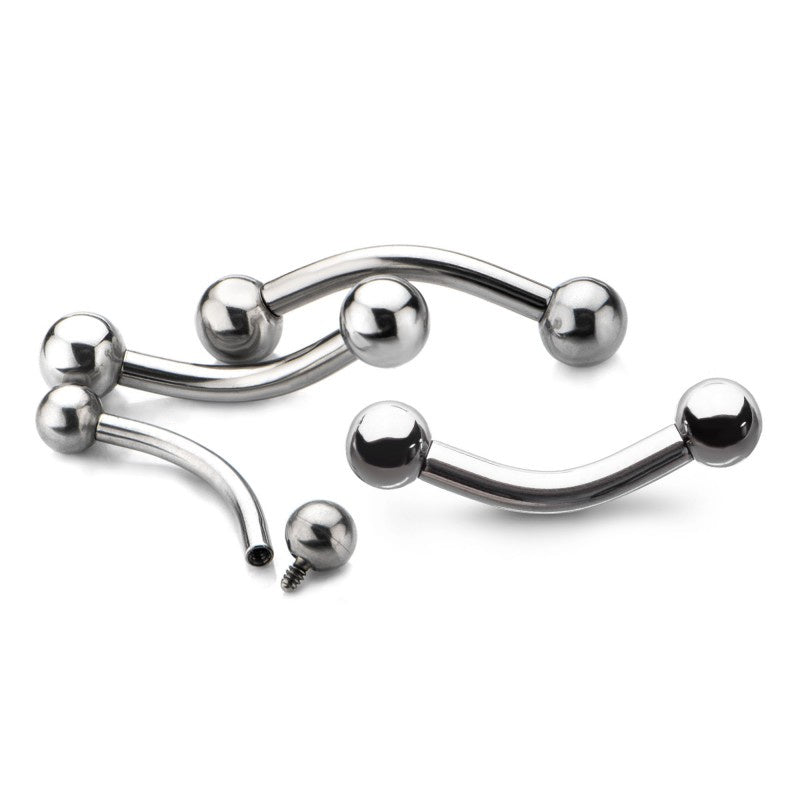Why Titanium is Best

Implant Grade Titanium (Ti-6AL-4V-ELI ASTM F136) is one of the most commonly chosen and trusted metals within the Professional Body Piercing industry in regards to Body Jewelry for several reasons including:
1. Biocompatibility: Titanium is nickel free and highly biocompatible. It is generally well-tolerated by the human body. This means it is less likely to cause allergic reactions or irritations when in contact with the skin or body tissues. It is an excellent choice for individuals with sensitive skin or metal allergies.
2. Low Allergy Risk: Titanium is non-reactive and does not contain common allergens like nickel. This reduces the risk of allergic reactions, which are relatively common with other metals used in jewelry.
3. Corrosion Resistance: Titanium is exceptionally corrosion-resistant, making it highly suitable for body jewelry that comes into contact with bodily fluids and sweat. It doesn't tarnish, rust, or degrade over time, ensuring the jewelry maintains its appearance and integrity.
4. Lightweight: Titanium is lightweight, making it comfortable for body piercings, where the weight of the jewelry can affect comfort and healing.
5. Strength and Durability: Titanium has excellent strength and durability, ensuring that the jewelry remains intact and functional even in high-stress areas like body piercings. It is less likely to break or bend.
6. MRI Compatibility: Titanium is non-ferromagnetic, making it safe for use in magnetic resonance imaging (MRI). This means that individuals with titanium body jewelry can undergo MRI scans without concerns about interference or discomfort.
7. Wide Range of Colors: Titanium can be anodized to produce a variety of vibrant colors, offering a wide range of aesthetic options for body jewelry.
8. Minimal Maintenance: Titanium jewelry is relatively low-maintenance, requiring minimal care and cleaning to retain its appearance and integrity.
9. Longevity: Titanium jewelry is known for its longevity, reducing the need for frequent replacements and minimizing the risk of complications due to metal sensitivities.
For these reasons, many Professional Piercers recommend Titanium for body jewelry, particularly for initial piercings. When choosing Titanium body jewelry, it's important to ensure that it is of high quality and meets safety standards. Reputable piercing studios and jewelry suppliers offer a range of Titanium jewelry options for safe and stylish body jewelry that enhances the overall piercing experience. Titanium metal is also commonly used in medical implants for several important reasons similar to why it is chosen within the Body Piercing industry:
1. Biocompatibility: Titanium is highly biocompatible, which means that it is well-tolerated by the human body. When implanted, the body's immune system does not typically reject or react negatively to titanium, reducing the risk of complications and allergic reactions.
2. Corrosion Resistance: Titanium is extremely corrosion-resistant, making it an excellent choice for long-term implantation/wear. It can withstand exposure to bodily fluids and is less likely to corrode or degrade over time.
3. Strength and Durability: Titanium is known for its exceptional strength-to-weight ratio. This property is crucial for medical implants, as it ensures the implant can withstand the stresses and strains it may encounter in the body.
4. Lightweight: Titanium is a lightweight metal, which can be advantageous for implants that are used in weight-bearing areas or for devices that require minimal impact on the patient's comfort and mobility.
5. MRI Compatibility: Titanium is non-ferromagnetic, making it safe for use in magnetic resonance imaging (MRI) and other diagnostic procedures that use strong magnetic fields. This ensures that patients with titanium implants can undergo such imaging without issues.
6. Low Density: Titanium's low density makes it a suitable material for implants, especially in cases where the implant needs to be lightweight.
7. Longevity: Titanium implants/jewelry are known for their long-term performance and durability, reducing the need for frequent replacements or revisions.
Common medical applications for titanium implants include dental implants, joint replacements (e.g., hip, knee, and shoulder), bone plates and screws, pacemakers, and
spinal implants. Titanium's unique combination of properties makes it an ideal material for medical devices, and in turn, also body jewelry.
